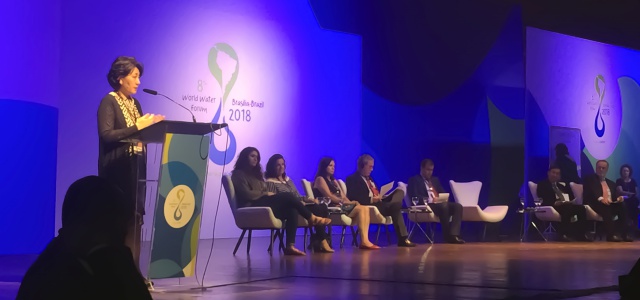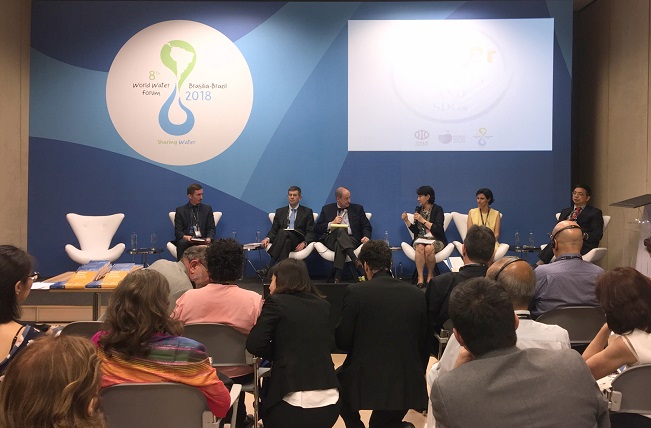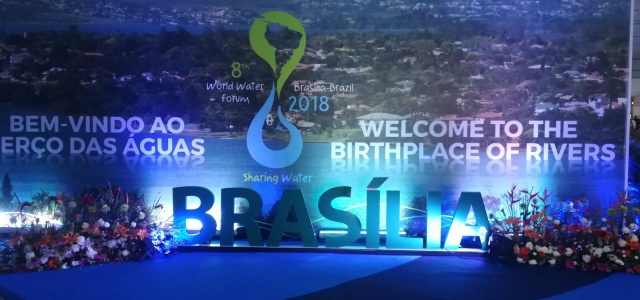The 8th World Water Forum was in Brasilia, 18 to 23 March 2018, emphasising “SHARING WATER” from multiple aspects.
GWP China, together with GWPO and other regional water partnerships, contributed innovations, lessons learned and achievements to the Forum. GWP family with partners have gradually explored their roles from ‘audiences’ to ‘speakers’, ‘organisers’, ‘panellists’ and ‘facilitators’.
 Oyun Sansaajuren at the High-Level Panel Session
Oyun Sansaajuren at the High-Level Panel Session
As a reliable connector for multiple-stakeholders participations (MSPs), “the network of GWP generates values and resources much more than other mechanisms. Especially regarding integrating SDG 6 and SDG 17, GWP now has thousands of partners in the world who form a foundation of our institutional network. It can generate more benefits or values through joint work. And MSPs reflect a miracle as 1+1>2, much more than a simple sum of its parts”, said Dr Oyun Sansaajuren, Chair of GWP when she was invited to deliver a keynote speech at the High-Level Panel Session: Inclusive Multi-Stakeholder Participation and Participatory Governance on 20 March 2018.
 Oyun Sansaajuren & Jerome Delli-Prisoli
Oyun Sansaajuren & Jerome Delli-Prisoli
in the panel of the Session of Water Security and SDGs
In the process of promoting IWRM, GWP China has a profound comprehension of MSPs and their potential benefits to achieving ‘water secured world’ as it states in the vision of GWP. During the forum, GWP China remained its role of connector linking the Ministry of Water Resources of China (MWR) and GWP to promote the safety of water resources and the 2030 Agenda at the Session of Water Security and SDGs on 19 March 2018. Together with Dr Xuewen Zhou, Vice Minister of MWR, the top brains of GWP, Dr Oyun Sansaajuren, Chair of GWP and Dr Jerome Delli-Prisoli, TEC Chair of GWP contributed to the Session. In the element of panel & free discussion, they inspired debate about links between water security & achievement of SDGs by 2030. The session was the most popular, and its venue appeared too tiny to audiences. Its attraction derived from speakers, topics and shared knowledge product. Published at the 8th World Water Forum, the Global Water Security: Lessons Learnt and Long-Term Implications is a joint intelligent product of MWR and WWC under the Scientific Committee of Dr Jerome Delli-Prisoli, Mr Hai Jin and Mr Zhao Hao with the MWR, and Guy Fradin with AWWP.
Down to grassroots, the Session of Water Governance and Communications in Cities revealed how to engage diverse urban stakeholders in the water management and utilisation. Under the ‘communications with the public about water governance’, Francois Brikké, Senior Network of GWP & Urban Waters Hub, invited panellists to the discussion. Frank van der Valk, Director of WIN who delivered his studies on communication about corruption; Yunzhong Jiang, Coordinator of GWP China talked about cases of communicating with citizens on waste management; Konstantina Tolli, Programme Manager of GWP MED, reflected outcomes of using video games for the urban water education; and Julie Perkins from GWOPA showed lessons of Peer-to-Peer Exchange.
 Francois Brikké interacted with Yunzhong Jiang
Francois Brikké interacted with Yunzhong Jiang
at the Session of Water Governance and Communications in Cities
Regarding communications with the public about water resources in cities, the experts in Europe, as Valk and Toli raised that 'even corruption issues in water community should put on the table and engage multiple groups to the final decision making; and multiple involvement would facilitate a democratic evolution of water governance'. The method would be dissimilar as Jiang introduced, 'effective laws and regulations could be a guarantee for the public involvement in the water governance, and it should apply diverse tools for different target stakeholders at each level'.
During the 8th World Water Forum, GWP network has involved in more 50 activities and strengthened the public awareness of water security and values of SDG 6 from different angles with positive responses.
More sessions, events or thematic activities are available to read on the right column.
